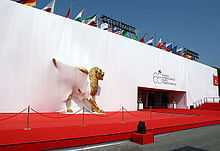Venice Film Festival
| Venice Film Festival | |
|---|---|
|
Venice International Film Festival logo | |
| Location | Venice, Italy |
| Founded | 1932 |
| Directed by | Alberto Barbera |
| Festival date | late August/early September |
| Language |
Italian English |
|
www | |
The Venice Film Festival or Venice International Film Festival (Italian: Mostra Internazionale d'Arte Cinematografica della Biennale di Venezia, "International Exhibition of Cinematographic Art of the Venice Biennale"), founded in 1932, is the oldest international film festival in the world.[1][2] The film festival is part of the Venice Biennale which was founded by the Venetian City Council in 1895. The Biennale consists (now) of a range of separate events including (the International Art Exhibition (Venice); the International Festival of Contemporary Music (Venice); the International Theatre Festival (Venice), the International Architecture Exhibition (Venice), the International Festival of Contemporary Dance (Venice), and the International Kids’ Carnival (Venice) of which the Venice Film festival is probably the best known event.
The film festival has since taken place in late August or early September on the island of the Lido, Venice, Italy. Screenings take place in the historic Palazzo del Cinema on the Lungomare Marconi and in other venues nearby. Since its inception the Film Festival has become the most prestigious international film festival in the world. The 72nd Festival is scheduled to take place from 2 to 12 September 2015.
Awards
The Film Festival's current awards are:
Official selection - In competition
Golden Lion (Leone d'Oro)

Awarded to the best film screened in competition at the festival
- See a list of winners at Golden Lion
Silver Lion Leone d'Argento
The Silver Lion is awarded to the best director in the competitive section Venezia (plus the number of the edition).
- See list of winners at Silver Lion
Volpi Cup (Coppa Volpi)
The Volpi Cups are awarded to:
- 'Best actor'
- 'Best actress'
Formal awards for best actor and best actress have been given since 1934. In the mid-1990s awards were also given to supporting actors and actresses.
- For a list of winners, see Volpi Cup.
Marcello Mastroianni Award
The "Marcello Mastroianni Award" was instituted in 1998 in honor of the great Italian actor Marcello Mastroianni who died in 1996. The award was created to acknowledge an emerging actor or actress, and can be compared to the "Volpi Cup", the award for Best Actor and Best Actress. [3]
'Special Lion'
The Jury may also choose to award a 'Special Lion' for an overall work to a director or actor of a film presented in the main competition section.
Orizzonti section (Horizons)
is open to all "custom-format" works, with a wider view towards new trends in the expressive languages that converge in film. The awards of the Orizzonti section are:
- The Orizzonti Prize
- The Special Orizzonti Jury Prize (for feature-length films)
- The Orizzonti Short Film Prize
- The Orizzonti Medium-length Film Prize
Controcampo Italiano section
presents a panorama on Italian cinema with 7 narrative feature-length films, 7 short films, and 7 documentaries, all world premiere screenings and all in competition in their respective categories. The awards of this section are:
- Controcampo Award (for narrative feature-length films)
- Controcampo Award (for short films)
- Controcampo Doc Award (for documentaries)
Best Screenplay Award
for best screenplay.
Lion of the Future
Award for a debut film.
Special Jury Prize
A Special Jury Prize is awarded to one or two films in most years.
- See list of winners at Special Jury Prize (Venice Film Festival)
Golden Osella
There are two Golden Osella Prizes: for Best Technical Contribution (to cinematographers, composers, etc.) and for Best Screenplay.
Jaeger-LeCoultre Glory to the Filmmaker Award
The “Jaeger-LeCoultre Glory to the Filmmaker” award was created by the Venice Film Festival and organized in collaboration with Jaeger-LeCoultre. It is dedicated to personalities who have made a significant contribution to contemporary cinema. [4]
| Year | Director | Nationality |
|---|---|---|
| 2007 | Kitano Takeshi | |
| 2008 | Abbas Kiarostami | |
| Agnès Varda | | |
| 2009 | Sylvester Stallone | |
| 2010 | Mani Ratnam | |
| 2011 | Al Pacino | |
| 2012 | Spike Lee | |
| 2013 | Ettore Scola | |
Past awards
Coppa Mussolini (Mussolini Cups)
The Mussolini Cups were the top awards from 1934 to 1942 for best Italian and best foreign film. Named after Italy's then dictator prime minister, Benito Mussolini, they were abandoned upon his ousting in 1943. [5]
Coppa Mussolini (Mussolini Cup) for Best Italian Film
| Year | English title | Original title | Director(s) |
|---|---|---|---|
| 1934 | Loyalty of Love | Teresa Confalonieri | Guido Brignone |
| 1935 | Casta Diva | Casta diva | Carmine Gallone |
| 1936 | The White Squadron | Lo squadrone bianco | Augusto Genina |
| 1937 | Scipio Africanus: The Defeat of Hannibal | Scipione l'africano | Carmine Gallone |
| 1938 | Luciano Serra, Pilot | Luciano Serra pilota | Goffredo Alessandrini |
| 1939 | Cardinal Messias | Abuna Messias | Goffredo Alessandrini |
| 1940 | The Siege of the Alcazar | L'assedio dell'Alcazar | Augusto Genina |
| 1941 | The Iron Crown | La corona di ferro | Alessandro Blasetti |
| 1942 | Bengasi | Bengasi | Augusto Genina |
Mussolini Cup for Best Foreign Film
| Year | English title | Original title | Director(s) | Country |
|---|---|---|---|---|
| 1934 | Man of Aran | Man of Aran | Robert J. Flaherty | United Kingdom |
| 1935 | Anna Karenina | Anna Karenina | Clarence Brown | United States |
| 1936 | The Kaiser of California | Der Kaiser von Kalifornien | Luis Trenker | Germany |
| 1937 | Dance Program | Un carnet de bal | Julien Duvivier | France |
| 1938 | Olympia Part One: Festival of the Nations | Olympia 1. Teil — Fest der Völker | Leni Riefenstahl | Germany |
| 1940 | The Postmaster | Der Postmeister | Gustav Ucicky | Germany |
| 1941 | Uncle Krüger | Ohm Krüger | Hans Steinhoff | Germany |
| 1942 | The Great King | Der große König | Veit Harlan | Germany |
Great Gold Medals of the National Fascist Association for Entertainment
"Le Grandi Medaglie d’Oro dell’Associazione Nazionale Fascista dello Spettacolo" in Italian.
This was awarded to Best Actor and Best Actress.[6] It was later replaced by the Volpi Cup for actors and actresses. The first time this prize was awarded to Katharine Hepburn for her role in Little Women by George Cukor [7]
Audience Referendum
In the first edition of the festival in 1932, due to the lack of a jury and the awarding of official prizes, a list of acknowledgements was decided by popular vote, an tally determined by the number of people flocking to the films, and announced by the Organizing Committee. From this the Best Director was declared – Russian Nikolaj Ekk for the film The Road to Life, while the film by René Clair Give Us Liberty was voted Best Film.
Award for Best Director
| Year | Director(s) | Title | Original title |
|---|---|---|---|
| 1935 | King Vidor | The Wedding Night | |
| 1936 | Jacques Feyder | Carnival in Flanders | La Kermesse Héroique |
| 1937 | Robert J. Flaherty and Zoltan Korda | Elephant Boy | |
| 1938 | Carl Froelich | Magda | Heimat |
See also
References
- ↑ Anderson, Ariston. "Venice: David Gordon Green's 'Manglehorn,' Abel Ferrara's 'Pasolini' in Competition Lineup". The Hollywood Reporter.
- ↑ "Addio, Lido: Last Postcards from the Venice Film Festival". Time.
- ↑ "Carnival of Venice -Marcello Mastroianni Award". Retrieved 2014-09-29.
- ↑ "Carnival of Venice, Portale di Venezia®-The 1930’s". Retrieved 2014-09-29.
- ↑ "La Biennale di Venezia - The 30s". Retrieved 2014-09-29.
- ↑ "La Biennale di Venezia - The 30s". Retrieved 2014-09-29.
- ↑ "Carnival of Venice, Portale di Venezia®-The 1930’s". Retrieved 2014-09-29.
External links
| Wikimedia Commons has media related to Venice Film Festival. |
- La Biennale di Venezia – Official website (English) (Italian)
- Venice International Film Festival history at La Biennale di Venezia website
- Venice Film Festival at the Internet Movie Database
| ||||||||||
| ||||||||||||||||||
| ||||||||||||||||||||||||||
Coordinates: 45°24′22″N 12°22′02″E / 45.405975°N 12.367290°E
